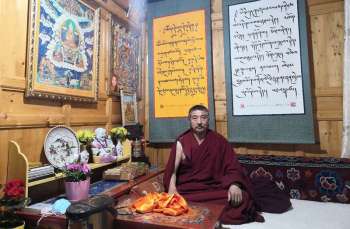We must heed the ways of achieving inner peace: His Holiness the Dalai Lama to Japan
Tokyo, Japan – "What distinguishes the human beings on our planet is that we can communicate with each other—we can convey a sense of the oneness of humanity. If we develop peace of mind within ourselves, I believe we can make the 21st century an era of peace,"the spiritual leader of Tibet Saturday told a crowd of thousands in Tokyo, saying: "We must heed the ways of achieving inner peace."
Worshipful or merely curious or somewhere in between, they gathered by the thousands the Hibiya Open-Air Concert Hall in Tokyo, a ninety year old theatre surrounded by trees Saturday for the simplest of reasons: to hear the spiritual leader of Tibet give a free talk on leading a life of kindness and happiness. Half the 2800 strong audience sat in the sun, the other half in the shade, on November 17, 2018.
“Brothers and sisters,” His Holiness began, “it’s a great honour for me to have the opportunity to share my views and experiences with you. Wherever I go I emphasize that all 7 billion human beings are physically, mentally and emotionally the same. Everybody wants to live a happy life free from problems. Even insects, birds and animals want to be happy.
“What distinguishes us human beings is our intelligence. However, there are occasions when we use it improperly, as, for example, when we use it to design weapons. Animals like lions and tigers that live by attacking and eating other animals have sharp teeth and claws, but human beings’ nature and teeth are more like those of a deer. We use our intelligence to fulfil our desires, to which, compared to those of other animals, there seems to be no limit.
“Right here and now we are sitting together in peace and pleasure, but at this very moment, in other parts of the world people are killing each other.
“As I said, devising ever more lethal arms is a poor use of human intelligence and the worst are nuclear weapons. You Japanese have actually been victims of nuclear attack and know what the consequent suffering is like. I’ve been to both Hiroshima and Nagasaki. On my first visit to Hiroshima I met a woman who had been through it and survived and I saw the watch in the museum that had stopped at the instant of the explosion and was half melted by the heat. So, instead of using our intelligence to create joy, the result has sometimes been fear.
“Here in the 21st century we should make an effort not to repeat the errors of the last century with its endless series of wars. Historians suggest that 200 million people died of violence during this period. It’s time to say, ‘Enough’. Let’s make the 21st a century of peace and compassion on the basis of the oneness of all 7 billion human beings alive today.
“Over-emphasizing difference of nationality, religion or race culminates in feelings of ‘us’ and ‘them’—division. We must remind ourselves that at a deeper level all human beings are the same. We all want to live a happy life and to be happy is our right. Throughout the universe are sentient beings seeking peace and happiness. What distinguishes the human beings on our planet is that we can communicate with each other—we can convey a sense of the oneness of humanity. If we develop peace of mind within ourselves, I believe we can make the 21st century an era of peace. We must heed the ways of achieving inner peace.
“There are no natural boundaries between human beings on this earth, we are one family. At a time of increasing natural disasters, climate change and global warming affect us all. We have to learn to live together, to work together and to share what we have together. The way we make problems for ourselves is senseless. We will achieve genuine peace in the world if we pursue demilitarization, but we need a sense of inner disarmament, a reduction of hostility and anger, to start with.
“A mother gave birth to each one of us and lavished us with care and affection, but once we go to school our education system fails to nurture this sense of loving-kindness. It’s aimed instead at fulfilling material goals. We need to re-introduce to education such inner values as warm-heartedness. If we could be more warm-hearted we’d be happier as individuals, contributing to happier families and wider communities too.
“Human beings are social animals. What brings us together is love and affection—anger drives us apart. Just as we employ physical hygiene to protect our health, we need emotional hygiene, the means to tackle our destructive emotions, if we are to achieve peace of mind.






